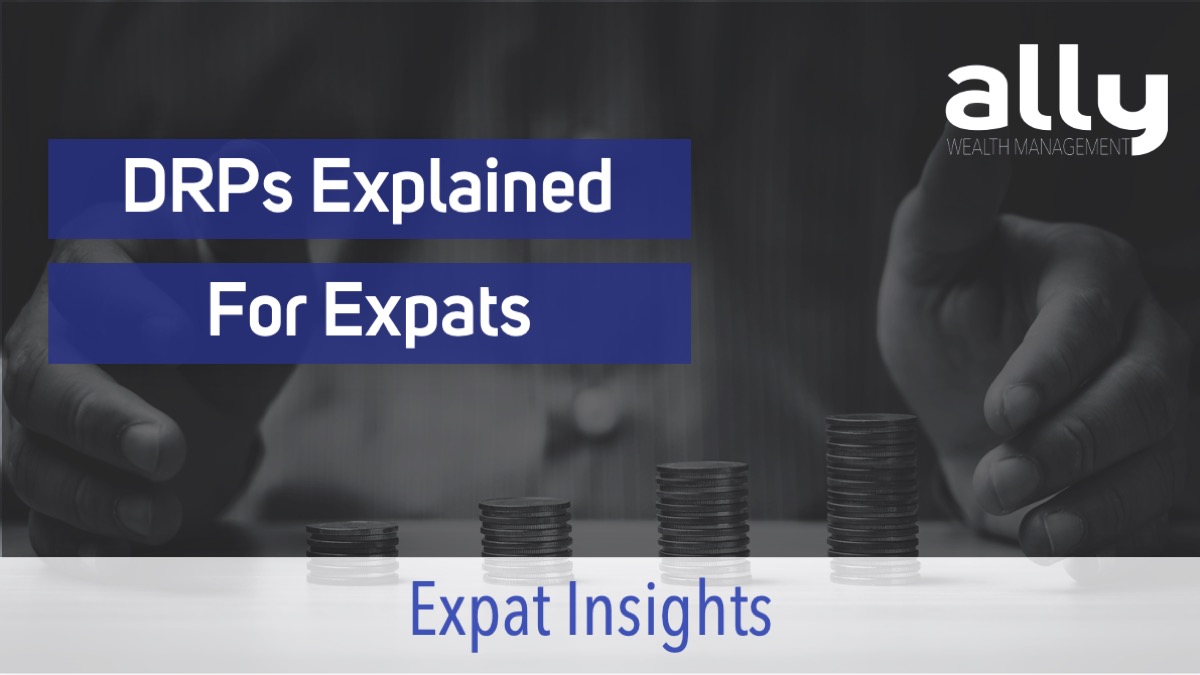DRPs Explained for Australian Expats
For Australian expats globally, Dividend Reinvestment Plans (DRPs) can be a powerful wealth-building tool, but understanding the tax implications is crucial, as rules vary between countries. This blog explores the benefits of DRPs and compares how they are taxed in different jurisdictions, particularly Australia and other expat hubs like Singapore and Hong Kong.
What is a DRP?
A DRP allows investors to automatically reinvest dividends into additional shares instead of receiving them in cash. This can significantly enhance long-term portfolio growth, thanks to the compounding effect. Over time, the more shares you hold, the more dividends you receive, creating a snowball effect as your wealth continues to build.
When it comes to investing in assets, there are two key forms of return – income and capital growth. In the case of dividends, we are focused on the income factor.
Why DRPs Matter for Australian Expats
As an expat, using a DRP can be especially beneficial for growing your wealth, but the taxation rules differ depending on where you reside. Australian expats need to carefully navigate these differences to avoid unexpected tax liabilities in both their home country and their current country of residence.
Taxation of DRPs in Australia
In Australia, DRPs are not tax-free. The Australian Taxation Office (ATO) treats reinvested dividends as taxable income, even if you don’t receive the cash. You’ll still need to declare dividends on your Australian tax return, which can reduce the benefit of compounding, as part of your investment is effectively taxed before it’s reinvested.
Example: If you receive a $100 dividend and reinvest it, you’ll still need to declare that $100 as income, potentially owing tax based on your marginal rate. For expats maintaining ties to Australia as Australian tax residents, this means you may need to lodge an Australian tax return and pay taxes on dividends, so it’s important to understand your tax residency.
Franking Credits: A Possible Advantage
Franking credits can help reduce the tax burden for Australian investors. Franking credits prevent double taxation, allowing you to offset some or all of the taxes paid by the company on your dividend income. For expats, franking credits may still be valuable, depending on your residency status and local tax laws.
How DRPs Work in Other Countries
Australian expats living abroad, especially in tax-friendly jurisdictions, may have an advantage when it comes to DRPs. In some countries, dividends are taxed differently, or not at all, making reinvestment strategies more effective.
Example: In places like Singapore, dividends are generally tax-free. This means that every dollar of dividends you reinvest through a DRP can go towards purchasing more shares, free from the tax drag seen in Australia. This creates a far more powerful compounding effect, allowing your wealth to grow faster without taxation diminishing your returns.
It’s important to note that this doesn’t limit you to only investing in the Singapore Stock Exchange (SGX) for example, but rather is based on your tax residency in Singapore in this example. As a tax resident of Singapore, the dividends that you receive from Australia for example that are fully franked, would not have any income tax or withholding tax applied.
Global Tax Considerations for Expats
As an Australian expat, understanding your tax residency status is essential. Your tax obligations may vary depending on whether you’re classified as an Australian resident for tax purposes or a non-resident.
- Resident for Tax Purposes: You must declare worldwide income, including DRP-related dividends.
- Non-resident: You’ll typically only need to declare Australian-sourced income, such as dividends from Australian shares.
Additionally, currency fluctuations can impact the value of your dividends if you’re reinvesting in a foreign currency.
Capital Gains Tax (CGT) Considerations
If you sell shares that you’ve accumulated through a DRP, capital gains tax may apply. For Australian expats, this can be a complex area, as your residency status can impact your CGT liability. Australian residents may be eligible for the CGT discount, whereas non-residents are generally not. It’s also important to understand both the Deemed Acquisition and Deemed Disposal rules when it comes to departing Australia and repatriating.
If you’re no longer a tax resident of Australia, it might be worth considering when to sell your shares to minimise CGT.
Maximising DRPs as an Expat
While DRPs offer a great way to build wealth, expats need to consider diversification. Reinvesting all your dividends into a single stock can lead to overexposure, which increases risk. Additionally, maintaining accurate records of dividend income, reinvested shares, and any eventual sales is crucial, particularly when navigating tax requirements in multiple countries.
Conclusion
For Australian expats, DRPs can be a highly effective tool for wealth accumulation, particularly in tax-friendly environments. However, understanding the tax implications in both Australia and your country of residence is key to making the most of this strategy. Navigating these complexities may require the help of a financial adviser with expertise in expat tax matters. By staying informed and compliant, Australian expats can fully leverage DRPs to grow their wealth while managing their tax obligations effectively.
Ally Wealth Management is the trusted ally in finance for Australians at home and across the globe. As both Australian expats and residents, the founders of Ally have a unique understanding of the common personal financial challenges faced.
Book your complimentary appointment with our team at Ally Wealth Management to discuss how we can help you to achieve your financial goals.
Ally Wealth Management Pty Ltd is a Corporate Authorised Representative of Sentry Advice Pty Ltd ABN 77 103 642 888. Sentry Advice holds an Australian Financial Services Licence (AFSL) No. 227 748.
General Advice Warning: The information contained herein is of a general nature only and does not constitute personal advice. You should not act on any recommendation without considering your personal needs, circumstances, and objectives. We recommend you obtain professional financial advice specific to your circumstances.




